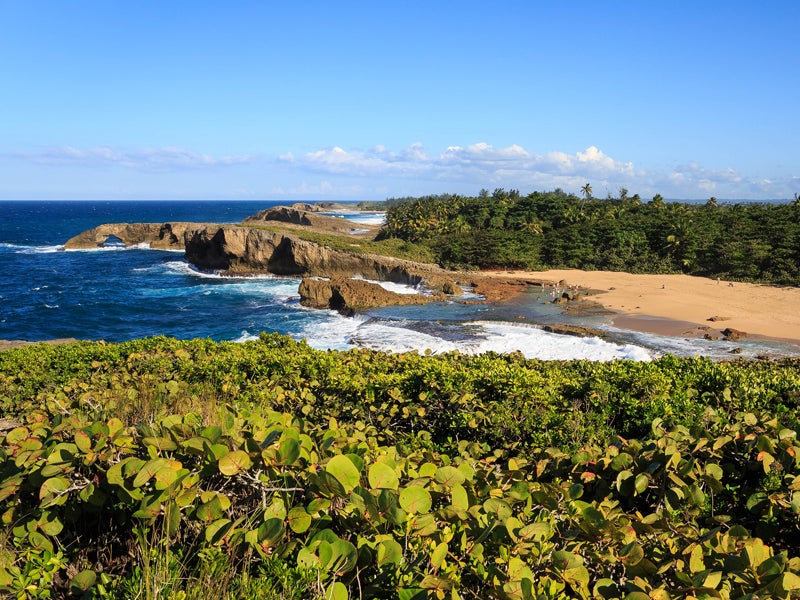Shutting Down a Wasteful Plan in Puerto Rico
An energy company is trying to fund the construction of a waste incinerator in Puerto Rico with federal dollars, even though the project could harm human health and the environment.

This page was published 9 years ago. Find the latest on Earthjustice’s work.
Puerto Rico is a tropical Caribbean archipelago that became a U.S. territory in 1898 after the Spanish-American war. Though its 3.5 million residents can’t vote in the upcoming presidential election nor elect voting representatives to Congress, federal laws passed in the U.S. still apply to Puerto Rico. Because of this, Energy Answers is attempting to use federal money for a dirty energy project on the island under the guise of sustainability.
Energy Answers has applied to the U.S. Department of Agriculture’s (USDA) Rural Utilities Service hoping to win government financing to construct a municipal waste incinerator in Arecibo, Puerto Rico. Earthjustice is representing local community groups who are against the idea of a hulking new polluter moving into their neighborhood. Last year, we submitted comments on the USDA’s inadequate environmental assessment of the project, and today, we submitted a notice to the USDA of our intention to sue if they don’t redo their deficient endangered species analysis.
Though it’s billed as a “waste-to-energy” facility, the project is little more than an incinerator. It would burn 2,100 tons of solid waste every day, sending plumes of toxic ash and pollutants, including lead and dioxins, into an area that is already plagued by noxious air. Even without a new incinerator, the region’s pollution already violates the Clean Air Act’s lead standard. Once lead enters the body, it travels through the blood and accumulates in the bones. According to the EPA, lead is a neurotoxin that also adversely affects kidney function, as well as the nervous, immune, reproductive and cardiovascular systems.
This large incinerator project creates a myriad of other problems, including threats to the region’s biodiversity. Arecibo is home to the Río Abajo State Forest, a subtropical preserve, and Caño Tiburones Natural Reserve, the largest wetland system on the island. The region also hosts at least 10 threatened or endangered animal species, including the Puerto Rican parrot, the Puerto Rican crested toad and the Puerto Rican boa. When Energy Answers prepared its environmental impact statement, it failed to consider the project’s effect on species living outside of the immediate construction site of the project. But the incinerator’s toxic air emissions would travel far beyond the immediate footprint of the incinerator and pose a risk to wildlife in the region’s state forests and conservation areas.
Furthermore, the project is expected to draw 2.1 million gallons of water a day from Caño Tiburones, a “globally in danger” site that is habitat for hundreds of species of birds. The Wetlands Program Director of the Biodiversity Research Institute believes there is a “high probability” that these daily water withdrawals would cause irreversible damage to the wetlands by upsetting the natural balance of its delicate ecosystem.
The incinerator is one of the most expensive and polluting ways to address waste, as well as one of the most expensive and polluting ways to produce electricity. Despite substantial public opposition and the availability of more economically beneficial and less environmentally harmful ways to handle waste—and the fact that Puerto Rico’s current electricity generation is already over capacity—the USDA is still considering the project. Even the municipalities whose waste would be burned in the incinerator are opposed to the project.
“Any way you look at it, the Arecibo incinerator is a disastrous idea for the people, environment and financial health of Puerto Rico,” said Earthjustice attorney Jonathan Smith. “USDA has not adequately looked at many of these issues, including impacts to threatened and endangered species, from a project that will emit tons of hazardous pollutants into the air and seeks to pump millions of gallons of water a day from Puerto Rico’s largest wetland reserve. USDA must conduct an endangered species consultation because the scarce analysis it has done to date does not meet the requirements of the law.”
Established in 2008, Earthjustice’s Northeast Office, located in New York City, is at the forefront of issues at the intersection of energy, environmental health, and social justice.